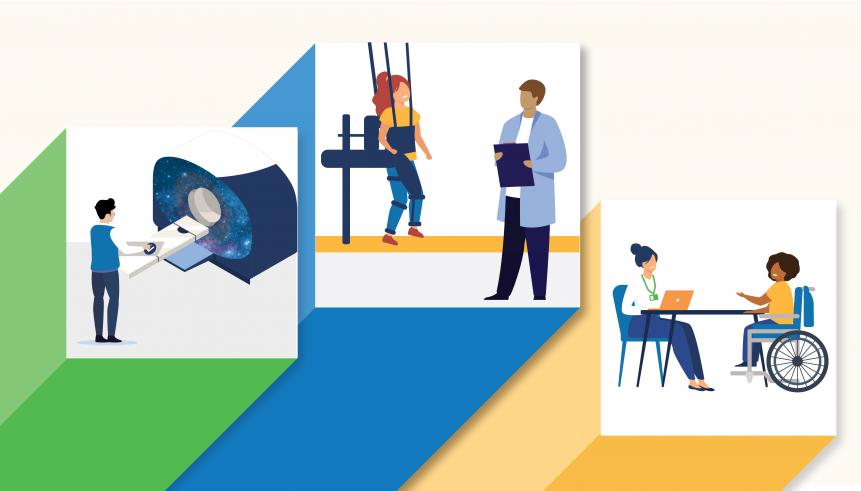
The 16th Annual BRI Symposium
Building Up and Building Out: Elevating and Expanding Childhood Disability Research
The 16th Annual BRI Symposium is a sought-after event that combines research and the family perspective in highlighting current and upcoming research, and engages health professionals, families, scientists, and government in a united discussion on key areas of focus in childhood disability research. It is Canada’s largest hospital-based pediatric disability health-research conference that combines research and the family perspective.
Held virtually this year on Monday, November 15th, the symposium was an opportunity to showcase the leaps and bounds that Canadian research has made in advancing the field of childhood disability globally through ground-breaking research, discovery, innovation, family engagement, and action. This year’s theme was Building Up and Building Out: Elevating and Expanding Childhood Disability Research.
The symposium drew just over 400 registrants this year, a record for the research symposium, and with many of the attendees from many backgrounds, from families and researchers to health-care professionals and industry partners.
Thank you to our Lead Sponsor, Ontario Brain Institute, for sponsoring this year's event:
_small.jpg)
The official BRI Symposium Event Guide gives you a detailed overview of the day-long virtual event. Its accessible format gives you a chance to jump to a specific section you'd like to checkout, such as the event agenda, the poster sessions, breakout panels or our dynamic key note speakers.
Missed some of the talks during the BRI Symposium? You can watch some of the highlights of the day here. Click on the closed captioning on YouTube if you would like to see the videos with live captions.
NUMBER | AUTHORS | TITLE | POSTER PRESENTER |
1 | Alanna Jane, Lisa Kanigsberg, Anmol Patel, & Dr. Melanie Penner.
| A qualitative analysis of the recommendations from Project ECHO Ontario Autism.
| Alanna Jane |
2 | Miss Elena Sheldrake, Mr. Brendan Lam, Miss Hiba AlHakeem, Dr. Nick Reed, & Dr. Shannon Scratch | Elena Sheldrake | |
3 | Sara Marshall, Rick Rusyn, Elizabeth Ramirez, Brendan Lam, Lauren Saly, Dr. Shannon Scratch | Adapting the Teach-ABI eLearning Module for High School Educators | Sara Marshall |
4 | Kate M. Einarson, Gillian King, Lisa A. Chiarello, Michelle Phoenix, Rachel D’Arrigo, Madhu Pinto | Kate Einarson | |
5 | Sally Lindsay, Hiba Ahmed | Hiba Ahmed | |
6 | Sara Stevens, Mary Stewart, Shannon Scratch, Hiba AlHakeem, Caron Gan, Lies Ferriman, Melissa Ngo | Caregivers Connecting after ABI (CCABI): Expanding Caregiver Support, Coping, and Knowledge | Mary Stewart |
7 | Calvin Ngan, Harry Sivasambu, Kerri Kelland, Sandra Ramdial, Jan Andrysek | Calvin Ngan | |
8 | Jennifer Ryan, Chuanlin Zhou, Ryan Hung, Virginia Wright | Jennifer Ryan | |
9 | McPherson, A.C., Chen, L., Church, P., de Groot, J.F., King, G., Labbé, A., Lui, T., Maltais, D.B., Mérette, C., Moffet, H., Moola, F., and Sandles, M. |
| Amy C McPherson |
10 | Abirami Vijayakumar; Dr. Melanie Penner; Dr. Shannon Scratch; Dr. Sally Lindsay |
| Abirami Vijayakumar |
11 | Aliaa Gouda, Dr. Jan Andrysek | Development of a Wearable Biofeedback System for Lower Limb Amputee Gait Training | Aliaa Gouda |
12 | Amy C McPherson, Christine Provvidenza, Kathryn Parker, Celeste Lumia, Madison Giles, Revi Bonder | Amy C McPherson | |
13 | R. Willis, N. Kapil, S. Aimola, S. Lam-Damji, A. Makino, the Baby-CIMT Implementation Group, D. Fehlings | Rachel Willis | |
14 | Dass R., Tendera A., Baerveldt A., Lewis I., Beal D | Ronessa Dass, Ardith Baerveldt | |
15 | Bilal Syed, Robyn Cardy, Jenny Nguyen, Suneeta Monga, Jessica Brian, Brendan Andrade, Evdokia Anagnostou, Eric Duku, Annie Dupuis, Azadeh Kushki | Examining the role of emotion regulation and physiological arousal in autism spectrum disorder | Bilal Syed |
16 | Sally Lindsay, Kendall Kolne Donna Barker, Angela Colantonio, Jennifer Stinson, Sandra Moll, Nicole Thomson | Sally Lindsay | |
17 | Sally Lindsay, Hiba Ahmed, Demitra Apostolopoulos | Demitra Apostolopoulos | |
18 | Gabriel Ng, Jan Andrysek | Gabriel Ng | |
19 | Sarah Qureshi, Emily Builing, Téa Christopoulos, Meaghan Walker, Timothy Ross | Sarah Qureshi
| |
20 | Hiba Al Hakeem, Anna Kiriakidis, Marie Hooper, Shannon Scratch | Key Elements of Interventions for Siblings of Children and Youth With Disabilities: A Scoping Review
| Hiba Al Hakeem, Anna Kiriakidis |
21 | Amy C McPherson, Celeste Lumia, Madison Giles, Revi Bonder, Dionne Gesink, Keisha Goberdhan, Marie Hooper, Dilshad Kassam Lallani, Patricia McKeever, Fiona Moola, Christine Provvidenza, Louise Rudden, Meenu Sikand, Joanne Wincentak | Amy C McPherson | |
22 | Madison Giles, Revi Bonder, Geoff Ball, Annick Buchholz, Arnaldo Perez Garcia, Jan Willem Gorter, Katherine Morrison and Amy C McPherson | Madison Giles | |
23 | Nicolas Ivanov, Tom Chau | Nicolas Ivanov | |
24 | Greg MacPhee, Virginia Wright, and Ilana D. Naiman | Greg MacPhee | |
25 | Niloufaralsadat Hashemi, Deryk Beal, Si Tou, Kristen Wong, Feny Pandya, Anna Tendera, Tom Chau | The Brain during Movement Execution and Movement Observation in Children | Niloufaralsadat Hashemi |
26 | Sophie Weaver1, Julia Hess1, Amanda Mac1, Meaghan Walker1, Timothy Ross1,2 | The Design and Experience of Play Spaces in Pediatric Healthcare Environments | Sophie Weaver |
27 | Jennifer Ryan, Deryk Beal, Darcy Fehlings, Virginia Wright | Jennifer Ryan | |
28 | Sally Lindsay, Azar Varahra, Hiba Ahmed, Sara Abrahamson, Sierra Pulver, Mara Primucci, Karen Wong | Mara Primucci & Karen Wong | |
29 | ID Naiman, L Black, S Martin, N Di Franco, M Dusseault, K Harvey, C Kierulf-Monaghan, and FV Wright
|
| Ilana D. Naiman |
30 | Diana Tajik-Parvinchi, Emily Nalder, Kate Einarson, Peter Rosenbaum, Kinga Pozniak, Madhu Pinto, Gillian King | The Socio-Cognitive Underpinnings of Resiliency: The role of self-regulation | Diana Tajik-Parvinchi |
31 | Calvin Ngan, Harry Sivasambu, Elaine Ouellette, Neil Ready, Kerri Kelland, Sandra Ramdial, Jan Andrysek | Towards a Digitally-Made Paediatric Transradial Prosthetic Socket | Calvin Ngan |
32 | Yukari Seko, Anna Oh, Keisha Goberdhan, Laura Hartman, Darlene Hubley, Payal Khazanchi, Nadine Vermeulen, and C.J. Curran | Transitions Theatre: An Arts-informed Interprofessional Education on Transition Support | Yukari Seko |
33 | Flora Wan, Pradeep Krishnan, Nomazulu Dlamini, Trish Domi, Sabrina Aimola, Darcy Fehlings | Flora Wan | |
34 | Ms. Vanessa Tomas, Dr. Shauna Kingsnorth, Dr. Bonnie Kirsh, Dr. Evdokia Anagnostou, Dr. Sally Lindsay | Ms. Vanessa Tomas | |
35 | Eric Smart, Ying Xu,Anna Oh, Dolly Menna-Dack, Carolyn McDougall, C.J. Curran, Laura Hartman | Eric Smart | |
36 | Revi Bonder, Madison Giles, Amy C McPherson |
| Revi Bonder |
37 | McPherson, A.C., Lui, T., Shum, K. | Katie Shum | |
38 | Michelle Servais (TVCC), Gillian King (BRI), Sheila Moodie (UWO), Tracy Shepherd (TVCC), Colleen Willoughby (TVCC), Linda Bolack (Independent), Deb Strachan (Independent), Megan Nichols (TVCC), Kate Einarson (BRI) | Michelle Servais and Kate Einarson
| |
39 | Jessica Wilk, Viktoriya Dyubanova, Ashley Ogilvie, Carleen Ginter, Gloria Lee, Sandra Ramdial, Virginia Wright, Lisa Artero | Lisa Artero | |
40 | Revi Bonder, Joanne Wincentak, Caron Gan, Shauna Kingsnorth, Christine F. Provvidenza, Amy C. McPherson | Revi Bonder | |
41 | Ashleigh Townley, Joanne Wincentak, Shauna Kingsnorth |
| Ashleigh Townley |
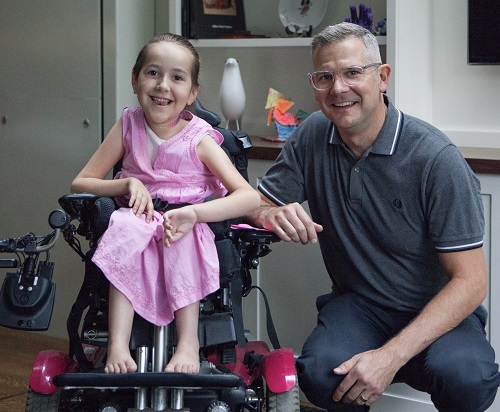
Photo credit: Angela Lewis
Will this Place Always Be Like This?
Presented by Dr. Ron Buliung, Graduate Chair of Geography and Planning, University of Toronto
Professor Buliung’s lived experience as a parent to a disabled child motivates his commitment to research and advocacy centered on place, childhood disability, and disability justice. In this talk, he uses stories and narratives from his family’s everyday life and his research as evidence of the problematic absence of disability justice; the giant chasm between “human rights” and lived experience. Professor Buliung sheds light on the inner workings of some places that do not make it easy to be a disabled child or a parent to one, places that extract substantial invisible physical and emotional labour to facilitate access to social participation. Indeed, life and research coalesce into a rejection of the status quo and the uneven meeting of minimum requirements. During his talk he shares research about access to education and food insecurity for disabled people. In doing so, he draws attention to elements of research design that centre childhood and disability, and key findings. Professor Buliung calls attention to public criticism (# thankyoutwitter!!!) about disability studies, arguing that such criticism paradoxically supports continued work as an ally-parent-scholar. He concludes with some discussion about future research possibilities.
Biography
Ron Buliung is a Full Professor in the Department of Geography, Geomatics and Environment at the University of Toronto Mississauga, and the Graduate Chair of the University of Toronto’s tri-campus Graduate Programs in Geography and Planning. He holds a PhD in Urban Geography from McMaster University. Ron has dedicated his career to studying the experiences of children and youth in cities. Early on, that work centred on the journey to school, inequalities in how children travel to school, and how school travel connects with and impacts childhood health.
During the past decade, however, he has re-oriented his research program to focus almost exclusively on the various ways in which disability and ableism permeate the institutions that govern and produce the places within cities where we live, work, play, and learn. He can take no credit for this sharp re-orientation in his research program. As the parent of a child with a neuromuscular condition known as spinal muscular atrophy and a direct recipient of care services from Holland Bloorview, Ron acknowledges the critical role that one of his children, who refers to herself as a disabled child, has played in reshaping the way she looks at and experiences almost everything. In this way, Ron occupies an isolated and dual space between academia and the lived experience of parenting a disabled child.
This coming year, he will teach the first course to be offered in the programs he chairs on the subject of disability. That course, entitled, “Disability and the City,” will host students from the University’s Master of Science in Planning, and research stream graduate students in geography. Through his teaching practice, Ron hopes to encourage the next generation of planning practitioners to explicitly consider the problems of ableism in their profession and in the built environment.
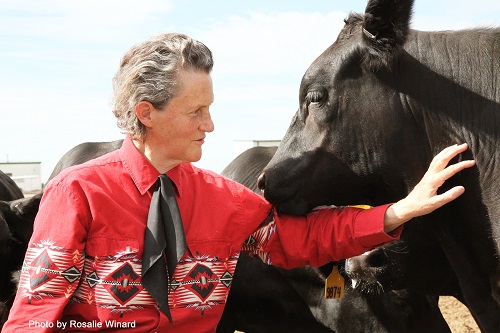
‘I am What I Do and What I Feel’
A Conversation with Dr. Temple Grandin, acclaimed scientist, inventor, author and autism advocate
Dr. Temple Grandin is well known to many as a trailblazer in her lifelong commitment to advocating for the autism community and her work in animal sciences. As a professor of animal science at Colorado State University for more than 25 years, she been referred to as the ‘most famous person working at CSU’ by her peers.
Her life’s work has been to understand her own autistic mind and to share that knowledge with others. She has challenged conventional stereotypes of ASD with messages about autism and ‘differently-abled brains’. A prolific author, she has penned best-selling publications on autism such as Emergence: Labeled Autistic.
Her understanding of her own mind has also helped her in her work with animal behaviour. She is one of the most respected experts both autism and in animal behaviour in the world. With her ability to visualize information, she has a successful career designing livestock equipment handling systems that are more humane. Today, have of the cattle in the U.S. are handled in facilities she has designed.
Her keynote, I am What I Do and What I Feel, will take delegates on a journey from her early childhood to illustrious career as an inventor, animal behaviourist, author and advocate. Dr. Evdokia Anagnostou, Canada Research Chair in Translational Therapeutics in Autism Spectrum Disorder and co-lead of Holland Bloorview's Autism Research Centre, will interview Dr. Grandin.
Biography
Temple Grandin is a professor of animal science at Colorado State University. When she was two and a half years old, she had no speech and all the symptoms of severe autism. Early intensive speech therapy enabled her to speak by age four. Her mother always encouraged her interest in art and urged her to draw many different things. Good teachers and mentors were essential for Temple’s success. Her high school science teacher challenged her with interesting projects where she had to figure out how to make things work. When studying in school became a pathway to becoming a scientist, she was motivated to study.
An HBO movie titled Temple Grandin was made about her life and Temple was inducted into The National Women’s Hall of Fame and The Academy of Arts and Sciences. Facilities she has designed handle over half the cattle in the U.S. Some of her most important books are New York Times Bestseller Animals in Translation, Thinking in Pictures, The Autistic Brain, and The Way I See It. Riding horses and caring for them helped her get through difficult teenage years when she was bullied and teased.
The Ontario Brain Institute (OBI) is advancing brain health solutions, from lab to life. As we embark on our next 10 years of existence, we continue our commitment to breaking down barriers for getting evidence-based technologies and practices into the community. An integral part of this process is to foster partnerships between community partners and companies to ensure the solution is impactful for the patient and their care partner. We will showcase of our on-going activities in this space and how we are creating shared wins for both the community and the company.
Speakers:
Tom Mikkelsen, MD
Tom Mikkelsen is the President and Scientific Director of the Ontario Brain Institute (OBI), a provincially funded, not-for-profit research centre that aims to establish Ontario as a world leader in brain research commercialization and care. Tom has had an impressive career in neurobiology, spearheading the Brain Tumor Program at Henry Ford Hospital, where he was key in building both the clinical trials program and laboratory of tumour biology. In his work with OBI, he advocates for a collaborative approach to science that engages both patients and industry in the process.
Christa Studzinski, PhD
Christa Studzinski is the Manager of Partnerships at the Ontario Brain Institute where she helps companies partner with clinicians, researchers, and patient groups, to clinically validate their technologies. Prior to joining OBI, she completed post-doctoral fellowships at the University of Kentucky and the University of Toronto. While completing her PhD in Pharmacology from the University of Toronto, she also co-founded a contract research organization and participated in research that led to the FDA approval of a medical food for Alzheimer’s disease.
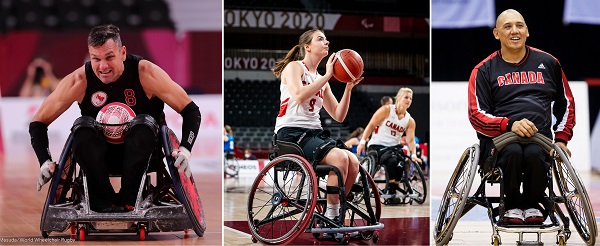
Have you every wondered what it takes to train for and compete in the Paralympics? Join us for an engaging panel discussion with Paralympians Mike Whitehead and Danielle Duplessis who will share their athletic journey with us and answer our questions on competing at an elite level. The panel will dig deep on the role that research and innovation have played in parasport and how emerging athletes can become a part of the parasport world.
The panel will be moderated by Dr. Virginia Wright, a senior scientist at BRI's SPARK Lab, and Roxy O'Rourke, a University of Toronto doctoral student studying kinesiology and physical education.
About Mike Whitehead
Before his spinal cord injury, Mike Whitehead was an avid multi-sport athlete who enjoyed basketball, volleyball, hockey, soccer and badminton. He was introduced to wheelchair rugby when his future teammates, including David Willsie, came to visit him at the Parkwood Rehabilitation Hospital in London, Ontario. He quickly became hooked on the contact and the level of competition and made the national team, just one year after his injury.
Mike has been a mainstay in Team Canada, have competed in four Paralympic games (2 silvers & 1 bronze), five World Championships (1 gold, 1 silver & 2 bronze) and two Parapan Am Games (1 gold & 1 silver). He has taken on a mentorship role with his younger teammates in recent years, by his sharing his experiences and knowledge of the sport.
Most recently, Mike coached Canada’s wheelchair rugby team at the Toronto Invictus Games and was a guest speaker at a TEDxBeaconStreet event in Boston.
About Danielle DuPlessis
Danielle was an accomplished multi-sport athlete in her home province of New Brunswick, competing on provincial and high-school basketball, soccer, and volleyball teams. Unfortunately, a series of injuries to her left knee that began at the age of 16 would eventually force her retirement from stand-up sports due to chronic pain and instability.
In 2017, shortly after her last knee injury, Danielle reached out to ParaSport New Brunswick to learn more about participating in wheelchair sports. She was welcomed into the adaptive sport world with open arms, and has been playing wheelchair basketball ever since!
Her career kicked off quickly, as she won Gold with the Canadian Women’s team at the 2019 Para Pan Am games in Lima, Peru only two years after beginning to play wheelchair basketball. Most recently, Danielle travelled to Tokyo to play in the 2021 Paralympic Games, where she and team Canada finished 5th. She is looking forward to playing in the upcoming wheelchair basketball world championships in Dubai, 2022.
Outside of her participation in para-sport, Danielle is also an active learner. She recently completed her M.Sc in Rehabilitation Science from the University of Toronto, where she was supervised by Dr. Shannon Scratch and Dr. Elaine Biddiss, and carried out her research at the Bloorview Research Institute! The enthusiasm and support of her supervisors allowed her to pursue her education while balancing the commitment of training as a high-performance athlete. Since defending her Master’s, Danielle has moved on to study at York University, where she is pursuing a degree in Clinical Developmental Neuropsychology.
About Richard ''Bear'' Peter
Richard Peter is a multi-award-winning Paralympic wheelchair athlete of Indigenous descent, who began playing wheelchair basketball at age 15 after a team came to his school and introduced him to wheelchair sports. He has been using a wheelchair since being injured in a bus accident at four years old. Since 2017, he started playing Para badminton and has quickly developed to being one of Canada’s top players. He credits his fast improvement to his wheelchair basketball experience.
Richard competed at five Paralympic Games with Canada’s wheelchair basketball team from 1996 to 2012, and won three gold medals in 2000, 2004, and 2012, with a silver medal in 2008. He is proud to have received the 2012 National Aboriginal Achievement Award for his outstanding athletic accomplishments. He was inducted into the BC Sports Hall of Fame in 2010, having been named Wheelchair Basketball Canada’s Male Athlete of the Year in 2008. Richard also received the Tom Longboat National Award for Aboriginal Male Athlete of the Year in 2000.
A member of the Cowichan Tribes of British Columbia, he was the only First Nations athlete on Canada’s Paralympic Team in Beijing in 2008.
For more information, please see ‘’Chiefs and Champions,” a 2007 documentary about Peter’s career and successes as a wheelchair basketball athlete.
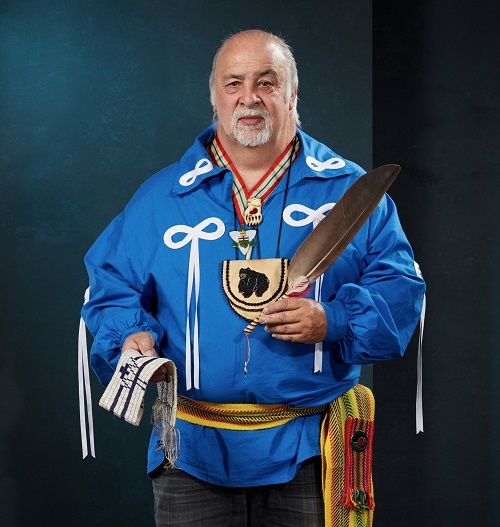
"A Talk from the Heart"
Presented by Elder Little Brown Bear, O.Ont.
Join us for a wide-ranging and interactive discussion with Ernest W. Matton (Athehsa Niohkwá:rita:a, Elder Little Brown Bear) - a highly respected Métis Elder and spiritual ambassador who blends Traditional teachings with mainstream information to provide holistic healing approaches for Aboriginal and non-Aboriginal community members.
Topics that may be covered during this session include the Two Row Wampum Belt, the Three C's of Healthy Relationships, creating welcoming health care environments for Indigenous people, Indigenous peoples' relationship to research, and enhancing health care equity for Indigenous people.
This talk will be informed by Elder Little Brown Bear's straightforward guiding philosophy, which is that "people don't care how much you know, they want to know how much you care."
Attendees are invited to ask questions at any point during this interactive session. The discussion will be moderated by Dr. Tim Ross, scientist, EPIC Lab and assistant professor (status only), University of Toronto's Department of Geography and Planning
Biography
Ernest W Matton, (Athehsa Niohkwá:rita:a) (Elder Little Brown Bear) – Is a highly respected Métis Elder, and spiritual ambassador who blends Traditional teachings with mainstream information to provide holistic healing approaches for Aboriginal and non-Aboriginal community members and professional disciplines.
He is both a sought-after seminar speaker and effective group facilitator an expert in the areas of Trauma/Addictions/Mental Wellbeing (Health), grief, suicide, conflict resolution, forgiveness, mediation, anger release, and Building Healthy Relationships.
He shares this expertise as a proud member of the Toronto East Health Network family. There, he is the, Director of Aboriginal Education, Programs, Culture and the Founder/Elder of theAccredited Leading PracticeAboriginal Healing Program a program he has spent the past nine years developing at Michael Garron Hospital Toronto East Health Network and Co Director and Co-Producer of Healing the Nation documentary and Conductor of the Bear’s Den All Nations Traditional Medicine Sweat Lodge.
He inspires bridging culture and professional disciplines in today’s hectic world, to assist people in finding what works. Drawing from his academic background, vast work and personal life experiences, he focuses on what works to bring balance and inspiration to everyday life and makes wellness practices and spirituality simple. He says that “being Aboriginal is not a life style it is a way of life".
He is a graduate of CANADORE COLLEGE and BROCK UNIVERSITY. He is a member in good standing with the (CACCF) Canadian Addiction Counsellors Certification Federation and (OAMHP) Ontario Association of Mental Health Professionals.
He wears the YELLOW SASH with pride in Honouring those missing and murderer Aboriginal Women and girls. He speaks to the commitment to breaking the cycle of violence and abuse. Elder Little Brown Bear’s guiding philosophy is simple: “People don't care how much you know, they want to know how much you care”.
He has been recognized for the following;
- Brock Alumni Achievement Award for Service beyond the classroom to make a real difference in the lives of those you work with.
- Inducted into the Order of Ontario by Ontario's Lieutenant Governor The Honourable Elizabeth Dowdeswell.
- Sovereign’s Medal for Volunteers in recognition of his contributions to Outstanding Indigenous Leadership by Her Excellency the Right Honourable Julie Payette, Governor General of Canada
- Received the very prestigious Barb Robinson Indigenous Award of Excellence from the Canadian Addictions Counsellors Certification Federation
- David Crombie 2018 Urban Leadership Award.
- Premier's Awards for College Graduates.
- Colleges Ontario – As a Premier’s Awards recipient, he was awarded a $5,000 bursary from the Ministry of Training, Colleges and Universities that will be donated to the college from which he graduated.
- Canadore College – 2018 Alumni Hall of Fame inductee.
- He has been Honoured with the Human Spirit Award by the Canadian College of Health Leaders
- The recipient of the Mino Bimaadiziwin Award (Indigenous Award), one of the City of Toronto's Access, Equity and Human Rights (AEHR) Awards.